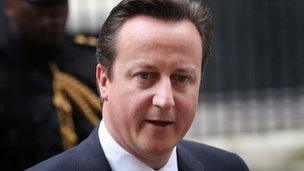David Cameron calls for coalition unity amid Lords divisions
- Published
- comments

David Cameron says differences between the parties will become clearer at the next election
David Cameron has called on Tories and Lib Dems to put aside their differences and unite behind the coalition.
Mr Cameron made the appeal in an article in the <link> <caption>Sunday Times</caption> <url href="http://www.thesundaytimes.co.uk/sto/" platform="highweb"/> </link> in the wake of last week's Conservative revolt over Lib Dem-led House of Lords reform.
He warned the coalition against falling into "division and navel-gazing".
But the chairman of the Tory backbench 1922 Committee said he believed the coalition was "very likely" to end before the 2015 general election.
"I think it would be logical and sensible for both parties to be able to present their separate vision to the public in time for the public to form a clear view before the election," Graham Brady told BBC Radio 4's The Westminster Hour.
"Of course, it is always possible that that moment of separation could come sooner. It's very difficult to predict when that might be."
Lib Dem minister Jeremy Browne earlier said the two parties needed to have a different "mindset" about co-operation and "raise the bar" on what could be achieved.
Divisions over House of Lords reform have led to speculation that the Lib Dems could withdraw their support for a re-drawing of Commons parliamentary boundaries in time for the next election.
'Tough choices'
After a difficult week for the coalition, Mr Cameron said it was essential that differences between the two parties did not stop them working together in the national interest.
"These differences matter and at the next election they will help define us. But we're not in an election, now. We're not even close," he said.
Sir Menzies Campbell says opinion polls show 70% of the public back reform of the House of Lords
"People see riots and financial instability across Europe on the television news. They will tolerate tough choices if they see that you stand up for the right things together.
"But they will not tolerate division and navel-gazing. They know that the problems are big and they do not want to see politicians fall out in the process of dealing with them.
"That is why we must rise to the challenge, recognise the extraordinary and challenging nature of the times we live in - and serve the national interest by delivering a strong, decisive and united government."
'Coalition mindset'
Mr Cameron said there were policy areas where there were "profound areas of disagreement", such as Europe and welfare, and this was likely to translate into big divisions at the next election.
The coalition suffered its biggest rebellion since it came to power after 91 Conservative MPs opposed plans for a mainly elected House of Lords.
The government still won the vote on the principle of its proposed reforms to Parliament, with a majority of 338 - but only after ministers ditched a vote to limit time for debating the bill.
Mr Browne, the Lib Dem foreign office minister, said the "ball was in the court" of the Conservatives and the ability to reach agreement went to the heart of the success of coalition policies.
"The best type of coalitions are where the parties are more than the sum of their parts, where they bid each other up and they raise the bar," he told the BBC's Sunday Politics.
"I think it is good for both of the parties to have that mindset... We do see it but we need to see it even more than we do at the moment. If you like, the mentality for both parties should be what can we add not what can we subtract from the coalition."
'Shambolic'
But former Lib Dem leader Sir Menzies Campbell described the coalition as a "marriage of inconvenience" and said there would be "a lot of hard talking" on the issue of Commons boundary reforms - thought likely to benefit the Conservatives - should plans to overhaul the Lords collapse.
"The idea that you would simply march into the lobby... to obtain this piece of legislation is one that may be very hard to swallow," he told the BBC's Andrew Marr show.
He suggested reform of the Lords and Commons were "two prongs of the same agreement and I expect the first to be honoured and I expect the second to be honoured as well".
Culture Secretary Jeremy Hunt told the same programme that the coalition would go through "tough patches" but he had "no doubt" that it would continue through to the next election.
But Labour's deputy leader Harriet Harman said the government had proved it was incapable of getting its "basic" responsibilities right.
"The last couple of weeks there has just been a shambles over the House of Lords," she told Dermot Murnaghan on Sky News.
"They have completely lost their focus on the things people are really worried about like jobs, the economy and also the basic issues of security."
Mr Cameron and Lib Dem Deputy Prime Minister Nick Clegg are expected to announce a £9bn rail investment plan on Monday in a show of unity.
- Published13 July 2012
- Published13 July 2012
- Published12 July 2012
- Published12 July 2012
- Published11 July 2012
- Published11 July 2012